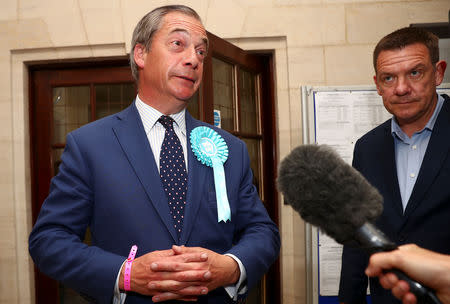UK ever more polarised as Brexit Party storms to EU vote win
By William James
SOUTHAMPTON, England (Reuters) - Nigel Farage's Brexit Party stormed to victory in a European election, riding a wave of anger at the failure of Prime Minister Theresa May to take the United Kingdom out of the European Union, partial results showed.
A European Parliament election that the United Kingdom only took part in because May delayed Brexit showed a country still relatively evenly divided over the EU divorce nearly three years since a 2016 referendum in which it voted 52% to 48% to leave.
The United Kingdom was supposed to have left on March 29 but it remains a member of the EU and its politicians are still arguing over how, when or even whether the country will leave the club it joined in 1973.
May on Friday announced she was stepping down, saying it was a matter of deep regret that she could not deliver Brexit.
Across England and Wales, voters turned away in anger from May's Conservatives and the opposition Labour Party of Jeremy Corbyn, which had sought a softer version of Brexit. The Conservative Party was on course for one of its worst results in a nationwide election ever.
The Brexit Party came first while explicitly pro-EU parties - the Liberal Democrats, Greens and Change UK - were, combined, a few percentage points behind.
"It looks like it's going to be a big win for the Brexit Party," Farage told reporters in Southampton in southern England where he is running.
Such a severe election drubbing for the two major parties will stiffen a belief among leading Conservatives vying to replace May that they must go for a more decisive split from the EU. But it will also increase pressure on Labour's Corbyn to come out explicitly for a second referendum on EU membership.
BBC projections put the Conservatives on around 10 to 12%, down from 23% in 2014. Labour came third in Wales. The Liberal Democrats even won in Corbyn's home constituency, Islington.
The Brexit Party won around 10 percentage points more than the UK Independence Party did in 2014, partial results showed.
In total, Britain will elect 73 MEPs (Members of the European Parliament) to the 751-seat parliament. They will not contribute directly to British policymaking on domestic issues like Brexit, but will have a say in EU-wide policy as long as they remain in the assembly.
'BREXIT BETRAYAL'
Farage casts Britain's political system as broken and says parliament and the government are trying to thwart Brexit. He wants the United Kingdom to leave the EU as soon as possible and says the damage of a no-deal departure has been exaggerated.
Farage, who as UKIP leader persuaded May's predecessor, David Cameron, to call the Brexit referendum and then helped lead the campaign to leave the EU, has said that failure to implement Brexit would show Britain not to be a democracy.
While the United Kingdom remains deeply divided over Brexit, most agree that it will shape the future of the United Kingdom for generations to come.
Pro-Europeans fear Brexit will undermine London's position as one of the world's top two financial capitals and weaken the West as it grapples with Donald Trump's unpredictable U.S. presidency and growing assertiveness from Russia and China.
The Liberal Democrats, who campaigned under the slogan "Bollocks to Brexit", oppose Brexit and want a second referendum to stop it.
The loss of Britain for the EU is the biggest blow yet to more than 60 years of efforts to forge European unity after two world wars, though the 27 other members of the bloc have shown surprising unity during the tortuous negotiations.
In the 2014 EU Parliament election, what was then Farage's UK Independence Party won with 26.8%, followed by Labour on 24.7% and the Conservatives on 23.3%. The Greens won 7.7% in 2014 and the Liberal Democrats 6.7%. Turnout was 35.6%.
(Writing by Kate Holton and Guy Faulconbridge; Editing by Frances Kerry and Mark John)

 Yahoo News
Yahoo News 

